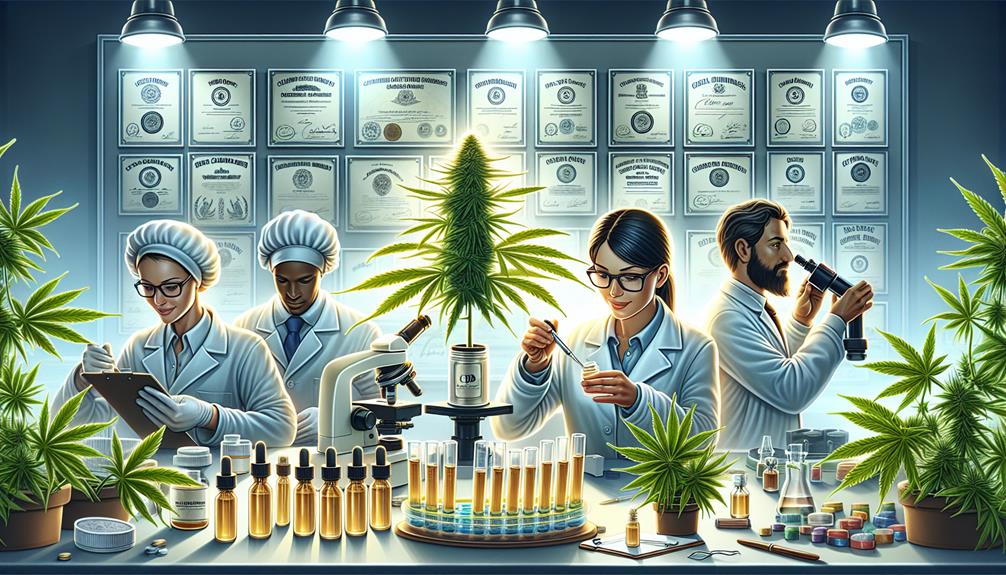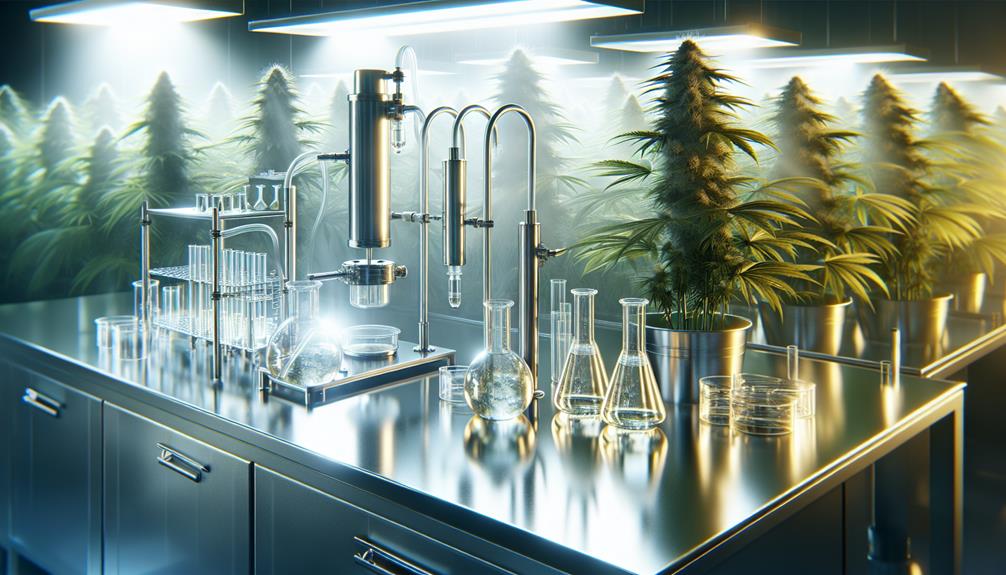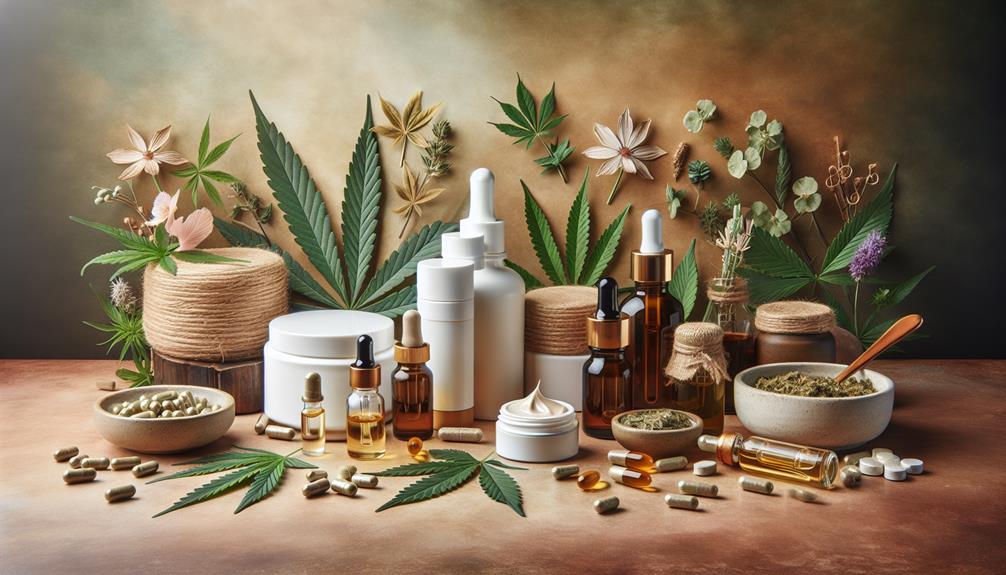Cannabidiol curiosity is climbing, and you've decided to discover what CBD can do for you. As a beginner, you're bombarded by a baffling array of products, each promising premium quality and unparalleled purity. It's crucial, however, to cut through the clutter and understand that not all CBD is created equal. You'll want to consider the concentration, the purity, the source, and the extraction methods, alongside the myriad of manufacturer claims. As you navigate this nascent niche, knowing what red flags to look out for and which golden standards to hold products against will be your beacon. Stay tuned to unveil the key factors that can empower you to make informed decisions about the CBD products that best suit your needs.
Understanding CBD Labels
When selecting a CBD product, it's crucial to decode the label to ensure you're getting a quality item that meets your needs. Read the label carefully; look for "hemp-derived CBD" to confirm the extract is sourced from legal hemp plants. You'll want to check the THC content as well—this ensures the product complies with legal standards, typically containing less than 0.3% THC.
Make sure the product has undergone third-party testing; this transparency is a hallmark of a trustworthy brand. Understand the type of CBD you're considering: full spectrum CBD includes various cannabinoids and terpenes, while broad spectrum CBD offers a range without THC. If you're seeking only cannabidiol, look for labels indicating CBD isolate.
Notice the CBD concentration per serving to find the amount that works for you. This will guide you in assessing the potency and help you manage your dosage. Don't overlook the extraction method; CO2 extraction is a clean and efficient technique that preserves the quality of the (hemp) extract. Lastly, consider the carrier oils used, as they can affect absorption and shelf-life. With this knowledge, you're well-equipped to choose a CBD product that aligns with your health goals.
Importance of Lab Reports
Understanding a product's lab report is essential, as it reveals the true nature of the CBD you're considering, ensuring it's safe, potent, and pure. When you're exploring the various types of CBD products, you must look for reputable CBD brands that provide detailed lab reports. These documents are a testament to the rigorous testing the products have undergone.
Lab reports are not just a formality; they're your insight into what you're putting into your body. They highlight whether the products that contain CBD also include harmful chemicals or contaminants that could undermine the benefits of CBD. By choosing a CBD brand that offers comprehensive lab reports, you're ensuring that you're getting the highest quality product available.
Here's a quick glance at what lab reports cover:
| Aspect Checked | Why It Matters |
|---|---|
| Cannabinoid Profile | Confirms potency and types of cannabinoids. |
| Purity | Ensures no harmful contaminants are present. |
| Safety | Verifies absence of heavy metals and pesticides. |
| Legal Compliance | Ensures THC levels are within legal limits. |
| Consistency | Confirms that every batch meets quality standards. |
Always take a moment to review these reports thoroughly. It's a critical step in making an informed decision about the CBD products you choose to use.
Recognizing Reputable Brands

When you're on the hunt for quality CBD, it's crucial to identify brands that prioritize third-party lab testing, ensuring the accuracy and safety of their products. You'll also want to look for clear information about the hemp source, with a preference for those using organic, non-GMO plants. Lastly, check for any brand certifications and memberships in industry associations, which reflect a commitment to high standards and best practices in the CBD industry.
Third-Party Lab Testing
To ensure you're purchasing high-quality CBD, always opt for products backed by third-party lab results. This crucial step helps you choose a reputable brand, as rigorously tested CBD products are a clear indicator of reliability. Third-party lab testing verifies the purity and potency of the CBD, which is essential since the Food and Drug Administration (FDA) doesn't regulate these products as strictly as other medications.
When scouting for the best CBD, look for products that proudly display their testing credentials. This transparency allows you to find the right CBD with confidence, knowing that what you're buying meets industry standards. Remember, quality CBD products that have been third-party lab tested offer a level of assurance that can't be overstated.
Hemp Source Transparency
By choosing CBD brands that openly disclose their hemp sources, you're taking an important step towards ensuring the quality and safety of your purchase. Hemp source transparency is fundamental in identifying reputable brands and high-quality CBD products. Here are three key reasons why:
- Verification of Quality: Knowing where the hemp plants are grown lets you verify the purity and quality of the full spectrum CBD oil and other products.
- Sustainability and Ethics: Brands that share their hemp cultivation practices often employ sustainable and ethical farming methods, reflecting a commitment to both the environment and consumer health.
- Avoiding Unwanted Additives: Transparency allows you to scrutinize any additional ingredients that go beyond the CBD found in hemp plants or hemp seed oil, helping you choose products that align with your wellness goals.
Brand Certifications & Memberships
Recognizing reputable CBD brands often involves looking for recognized certifications and memberships that reflect their commitment to quality and industry standards. When choosing quality CBD products, check for USDA Organic, GMP, or ISO 9001 certifications to ensure safety and quality controls are met. Reputable brands may also be part of the US Hemp Authority or the National Hemp Association, which shows they adhere to best practices. Ensure the brand has third-party testing and certifications from bodies like NICI or AHPA. Memberships in trade associations like HIA or AMMPA are also key indicators of a brand's dedication to industry regulations and ethics. These credentials suggest a brand's transparency and compliance, guiding you to quality CBD products tailored to your specific needs, offering health benefits without the need for medical advice.
Extraction Methods Explained

Understanding the various extraction methods is key to ensuring you choose a CBD product that's both safe and high quality. When you're eyeing those CBD oils or considering how to consume CBD effectively, you'll want to know how the CBD was extracted from the cannabis plant. Here's a quick rundown:
- CO2 Extraction: This method uses pressurized carbon dioxide to pull CBD and other compounds from the plant. It's highly regarded because it yields pure CBD, full spectrum hemp oil, and other cannabinoids found in the cannabis without residual solvents.
- Ethanol Extraction: A more cost-effective method, ethanol extraction involves using high-grade grain alcohol as a solvent. While it can produce high-quality CBD, there's a greater risk of contamination with solvents, which could compromise the product's purity.
- Hydrocarbon Extraction: Utilizing solvents like butane or propane, this technique can extract potent CBD; however, it requires meticulous purification processes to ensure no harmful chemicals are left behind.
Extraction methods explained in these terms should clarify why some products are labeled as safer or purer than others. It's all about the process – and understanding this can guide you to the best quality CBD for your needs.
CBD Concentration Levels
When selecting a CBD product, it's crucial to consider the CBD concentration levels, which determine the potency and can guide your dosage decision. These levels indicate how much CBD you take with each use. If you're new to CBD, starting with a product that has lower CBD concentration levels is a smart move. This allows you to gradually increase your intake as needed, ensuring that it fits your active lifestyle without overwhelming your system.
Remember, CBD is non-psychoactive, so adjusting the dosage is more about finding the balance for your wellness needs. For example, a CBD tincture might come with a dropper for administration. You could start with just a couple of drops and work your way up to a full dropper if needed.
Here's a quick guide to understanding CBD concentration levels:
| CBD Product Type | Typical CBD Concentration |
|---|---|
| Full Spectrum CBD | 250mg – 1500mg per bottle |
| CBD Tincture | 500mg – 3000mg per bottle |
While full spectrum products contain a range of cannabinoids, including trace amounts of THC, the CBD concentration levels provide the main therapeutic effects. By checking these levels, you are better equipped to choose a product that aligns with your wellness goals.
Types of CBD Products

You'll find CBD comes in various forms, each with its own concentration levels and uses. Whether you opt for full-spectrum, broad-spectrum, or isolate products, understanding the specific CBD concentrations is crucial to tailoring your experience. Keep in mind that oils and tinctures offer quick absorption, while topicals target localized areas without ingestion.
CBD Product Varieties
Exploring the varieties of CBD products available can help you find the one that best fits your needs, whether you're looking for the synergistic benefits of full-spectrum oils or the purity of CBD isolate. Here's what you should consider:
- Full-Spectrum Oils: Extracted from Cannabis sativa, they include a range of cannabinoids and terpenes, often blended with MCT oil for better absorption.
- CBD Topicals: Ideal for applying a thin layer directly to the skin, these may combine CBD with a blend of essential oils for targeted relief.
- CBD Drinks: A refreshing way to take CBD, these beverages are infused with varying concentrations for easy consumption.
Understanding CBD Concentrations
After considering the various CBD product options, it's crucial to understand the concentrations available to determine what will best suit your therapeutic needs. Understanding CBD concentrations is key to ensuring you're taking CBD that aligns with your health objectives. Whether you choose full spectrum, broad spectrum, or CBD isolate, how much CBD you take matters.
Here's a breakdown of CBD types and their features:
| Type | THC Content | Additional Compounds |
|---|---|---|
| Full Spectrum | <0.3% | All found in cannabis, entourage effect |
| Broad Spectrum | 0% | Cannabinoids and terpenes, no THC |
| CBD Isolate | 0% | Pure CBD, no other cannabis compounds |
Selecting the right CBD products means considering these concentrations, which are tailored to different preferences and needs.
Final Considerations
When selecting a quality CBD product, it's crucial to weigh the potential benefits of the entourage effect against your specific needs and preferences. Full-spectrum CBD may offer the best range of benefits, including the entourage effect, due to the presence of a wide range of cannabinoids and terpenes.
Here are three key points to consider:
- Transparent Sourcing: Always choose brands that provide comprehensive third-party lab testing results, ensuring you're getting what's advertised.
- Method of Extraction: CO2 extraction remains the gold standard for obtaining high-quality CBD, so check the extraction method.
- Legal Compliance: Stay informed about the legal status of CBD in your area; compliance with state or country regulations is a must.
As you find the perfect product, remember to consider how much CBD you take, which can vary based on whether it's your first time or you're an experienced user. Be sure to take all these factors into account to buy CBD that aligns with your health goals. Armed with knowledge and keen attention to detail, you'll be well on your way to choosing the perfect CBD product for your needs.
Frequently Asked Questions
How Do I Choose a Quality CBD Product?
To choose a quality CBD product, check the hemp source and THC content. Ensure it's undergone lab testing, with a Certificate of Analysis available. Evaluate the extraction method and product purity. Look for a reputable brand with positive user reviews. Consider the cannabinoid spectrum, opting for broad or full-spectrum options. Always read the label for a clear understanding of what you're getting before making a purchase.
What Form of CBD Is Best for Beginners?
Just like picking your first gourmet coffee, choosing the right CBD type is key. You'll want to consider consumption methods, starting with a tincture or capsule. Keep dosage considerations in mind; begin low and go slow. Opt for products with clear indications of purity and third-party testing to ensure quality. Full-spectrum offers additional benefits, but remember, extraction techniques can affect potency. Flavor options vary, so pick what appeals to you, and consider bioavailability factors.
Which CBD Product Is Right for Me?
You'll want to consider product potency, hemp source, and extraction method to ensure quality. Look for lab testing and ingredient transparency to verify purity. Full-spectrum products include THC content, so check legality and your intended use. User reviews can guide your choice, but remember to consult healthcare providers, especially for interactions or specific health concerns. Your personal needs will ultimately dictate which CBD product is right for you.
How Do I Choose My Cbd?
You're navigating a sea of options, but remember, "you get what you pay for." Prioritize CBD purity and extraction methods that ensure quality. Insist on lab testing for peace of mind, and consider hemp sourcing to support ethical practices. THC content matters for legal and personal reasons, while carrier oils affect absorption. Dive into product reviews and weigh brand reputation against price comparison to find your perfect CBD match.
